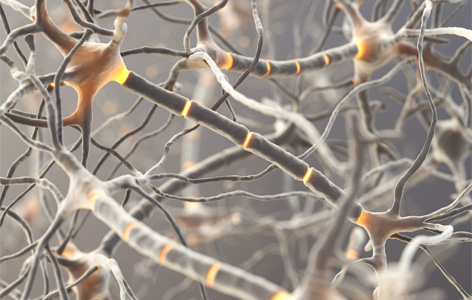Home page Description:
Researchers identify a set of genetic mutations that lead to brain tumours.
Posted On: November 07, 2016

Image Caption:
Schwann cells (pictured as log-like structures) wrap around and insulate nerves. They are essential for nerve function and enable electrical impulses to be transmitted efficiently.
Schwannomas are tumours that arise from Schwann cells—cells that are essential for brain function and associate with and support nerve cells. Depending on the size of the tumour and the location of the affected nerve, schwannomas in the brain or spine can lead to hearing loss, imbalance, paralysis and death.
Schwannomas in the brain or spine are typically treated with radiation and/or surgery; however, these treatments often do not kill all of the cancer cells, leading to recurrence of the cancer.
The development of ‘targeted therapies’ may help overcome the limitations of radiation and surgery; however, this would require comprehensively mapping of the genomic landscape of schwannoma to provide insight into the molecular mechanisms that drive disease.
Drs. Gelareh Zadeh (PM Scientist) and Kenneth Aldape (PM Senior Scientist) initiated a study to generate such a map. Using state-of-the-art molecular approaches, their research team analyzed the mutational status of all of the genes that are turned on in schwannomas. They found previously unknown mutations in several genes that may be involved in cancer progression.
Notably, the team identified an abnormal gene that was unique to schwannomas. Subsequent tests revealed that the gene changed the behaviour of cells and promoted tumour development in experimental models; as such, it represents an ideal molecular target that could be used to develop effective anticancer drugs for schwannoma cells.
“The genomic map that we developed lays the foundation for highly targeted therapies that can be customized to individual patients,” explains Dr. Zadeh. “By using the molecular aspects of a tumour, we can now begin to develop effective strategies that target hard-to-treat schwannomas.”
This work was supported by the Canadian Institutes of Health Research, the Terry Fox Research Institute, the Wilkins Family Chair in Brain Tumor Research (G Zadeh), the MacFeeters-Hamilton Neuro-Oncology Research Program (K Aldape) and The Princess Margaret Cancer Foundation.
The genomic landscape of schwannoma. Agnihotri S, Jalali S, Wilson MR, Danesh A, Li M, Klironomos G, Krieger JR, Mansouri A, Khan O, Mamatjan Y, Landon-Brace N, Tung T, Dowar M, Li T, Bruce JP, Burrell KE, Tonge PD, Alamsahebpour A, Krischek B, Agarwalla PK, Bi WL, Dunn IF, Beroukhim R, Fehlings MG Bril V, Pagnotta SM, Iavarone A, Pugh TJ, Aldape KD, Zadeh G. Nature Genetics. doi: 10.1038/ng.3688. 2016 Oct 10. [Pubmed abstract]
Schwannomas in the brain or spine are typically treated with radiation and/or surgery; however, these treatments often do not kill all of the cancer cells, leading to recurrence of the cancer.
The development of ‘targeted therapies’ may help overcome the limitations of radiation and surgery; however, this would require comprehensively mapping of the genomic landscape of schwannoma to provide insight into the molecular mechanisms that drive disease.
Drs. Gelareh Zadeh (PM Scientist) and Kenneth Aldape (PM Senior Scientist) initiated a study to generate such a map. Using state-of-the-art molecular approaches, their research team analyzed the mutational status of all of the genes that are turned on in schwannomas. They found previously unknown mutations in several genes that may be involved in cancer progression.
Notably, the team identified an abnormal gene that was unique to schwannomas. Subsequent tests revealed that the gene changed the behaviour of cells and promoted tumour development in experimental models; as such, it represents an ideal molecular target that could be used to develop effective anticancer drugs for schwannoma cells.
“The genomic map that we developed lays the foundation for highly targeted therapies that can be customized to individual patients,” explains Dr. Zadeh. “By using the molecular aspects of a tumour, we can now begin to develop effective strategies that target hard-to-treat schwannomas.”
This work was supported by the Canadian Institutes of Health Research, the Terry Fox Research Institute, the Wilkins Family Chair in Brain Tumor Research (G Zadeh), the MacFeeters-Hamilton Neuro-Oncology Research Program (K Aldape) and The Princess Margaret Cancer Foundation.
The genomic landscape of schwannoma. Agnihotri S, Jalali S, Wilson MR, Danesh A, Li M, Klironomos G, Krieger JR, Mansouri A, Khan O, Mamatjan Y, Landon-Brace N, Tung T, Dowar M, Li T, Bruce JP, Burrell KE, Tonge PD, Alamsahebpour A, Krischek B, Agarwalla PK, Bi WL, Dunn IF, Beroukhim R, Fehlings MG Bril V, Pagnotta SM, Iavarone A, Pugh TJ, Aldape KD, Zadeh G. Nature Genetics. doi: 10.1038/ng.3688. 2016 Oct 10. [Pubmed abstract]




